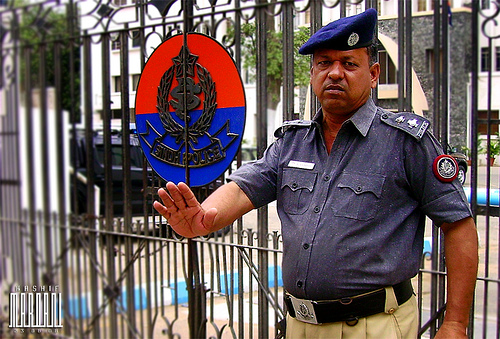Why You Should Avoid Using Tripods in the City
Say what? Tripods allow digital cameras to take longer exposures without experiencing "camera shake", allowing you to take clearer pictures, especially useful at nighttime or other low-light situations. So why would this article suggest you not use one when in an urban environment?
Unfortunately, using a tripod in the middle of a city can cause you to receive all sorts of undesired attention. Even if you are on a public street, to all appearances out of the way of other passers-by, operating a digital camera on a tripod can potentially get you into trouble with over-aggressive (but usually well-intentioned) security or police officers.
![No tripods [squared circle]](https://static1.discoverdigitalphotography.com/wp-content/uploads/2011/why-you-should-avoid-using-tripods-in-the-city/No-tripods-sign.jpg)
No tripods [squared circle] by Mr Wabu on flickr (licensed CC-BY-SA)
Tripods, in many peoples' eyes, cross the line from one being a tourist to one being a professional photographer. Some cities may require photography permits for professionals. Even if your photos are for personal use, arguing this fact may prove pointless.
Officers might cite security concerns, especially if you are taking photos that include government or transit buildings (in some areas, doing so can arouse a lot of suspicion).
Some may claim an outdoor art installation or building's facade is copyrighted, requiring a permit or designer's permission to shoot photos in the area.
On a public sidewalk, you may be told that using a tripod blocks the normal public's right-of-way. On busy streets, especially during rush-hour, this point may be valid.
Sadly, some officers may hassle you by claiming you are on private property even if you place your tripod on a public sidewalk.

Wait ... Stop !! no photography here ... by Kash_if on flickr (licensed CC-BY)
While in some circumstances, legally, you should be able to shoot photos (though your situation may vary, and this article is not handing out legal advice), is it worth the potential hassle of getting security and/or police involved? Unless you have prior permission from a building's owner and possibly a city permit where required, using your digital SLR or point-and-shoot camera without a tripod may cause you to experience much less hassle.
If you decide to not use a tripod, there are a few tricks to help ensure your photos will come out clear. Some involve a few tweaks to your digital camera settings, others may be as simple as changing how you hold your camera:
When you don't have a tripod available and hand-hold your digital camera, set its exposure time to be as quick as possible to avoid "camera shake". Set it too fast, though, and your photos will come out dark. Experimentation by bracketing (taking multiple photos of the same subject with slightly-adjusted settings) is key to getting the images you want.
Adjust what is called the digital camera's ISO settings to allow for quicker exposures at the expense of some noise entering the photo. With most cameras you should be able to adjust this setting to 200; many digital SLRs can give pleasing results with ISO settings of 400 or 800. Sometimes, a more expensive camera and/or a faster lens may help.
Do not release your digital camera's shutter button until it has finished taking the photo. Even this slight movement can blur photos.
Steady your digital camera. Hold it close to your body as you shoot. Keep your elbows in and brace them on your chest or stomach. When applicable, keep your camera closer to your face by looking through its viewfinder instead of an LCD screen. Obviously, if your hands are jittery, this can cause camera shake, so if you are more relaxed your photos may turn out clearer.
City photography can be a fun and rewarding experience with new photo opportunities seemingly around every corner. Don't let this enjoyment be spoiled by brushes with security or the law. Consider leaving your tripod at home to avoid attracting excess attention. To offset potential camera shake, practice holding your camera and adjusting its settings to allow for quicker exposures. Most cities welcome tourists to take photos but take a harder line against 'professionals' - do what you can to not be visually lumped into this category while still taking great photographs.
Copyright 2009 Andrew Malek.




